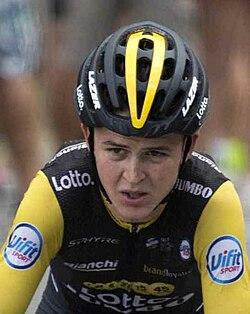In a significant blow to the integrity of competitive cycling, Dutch professional cyclist Antwan Tolhoek has been handed a four-year ban after testing positive for anabolic androgenic steroids. The Dutch Cycling Federation announced the suspension following anti-doping control procedures that confirmed the presence of prohibited substances in Tolhoek’s samples. The ruling has sparked widespread discussions about doping in sports, the effectiveness of current regulatory measures, and the consequences athletes face when they break these stringent rules. This incident not only casts a shadow over Tolhoek’s career but also raises questions about the broader implications for the sport of cycling as it continues to battle the pervasive issue of doping.
Antwan Tolhoek Faces Four-Year Ban Following Positive Test for Anabolic Steroids
In a significant development for the cycling community, Antwan Tolhoek has been sanctioned with a four-year ban after testing positive for anabolic androgenic steroids. The ruling comes from the international governing body for cycling, which has maintained a rigorous stance against doping. Tolhoek’s suspension will keep him from competitive cycling until July 2027, casting a shadow over his professional career and future achievements. This incident underlines the ongoing battle against performance-enhancing drugs in sports, as athletes are increasingly held accountable for their actions both in and out of competition.
The repercussions of this decision extend beyond Tolhoek himself, impacting team dynamics and sponsorships within the cycling world. Key points regarding the situation include:
- Testing Procedure: The test was part of routine checks that aim to uphold fair play across the sport.
- Response from Tolhoek: There has been no formal statement from the cyclist regarding the findings or his intentions to appeal.
- Historical Context: This ban adds Tolhoek’s name to a growing list of athletes who have faced similar charges, stressing the necessity of clean sport.
As the cycling fraternity grapples with the implications of this decision, the focus shifts towards fostering a culture that champions integrity. Stakeholders in the sport are calling for more effective education and preventative measures to reduce the incidence of doping. A brief overview of notable doping cases in cycling highlights the need for continued vigilance:
| Year | Athlete | Ban Duration | Substance |
|---|---|---|---|
| 2012 | Lance Armstrong | Lifetime | Various |
| 2015 | Fabian Cancellara | 2 years | Testosterone |
| 2019 | Romain Bardet | 1 year | Corticosteroids |
Implications of Tolhoek’s Suspension on Professional Cycling and Athlete Integrity
The four-year suspension of Antwan Tolhoek for testing positive for anabolic androgenic steroids has far-reaching implications for professional cycling and the integrity of its athletes. As the cycling community grapples with this latest doping scandal, the reaction from fans, sponsors, and regulatory bodies stands as a stark reminder of the sport’s ongoing battle against performance-enhancing drugs. The decision not only tarnishes Tolhoek’s reputation but also raises pressing questions about the effectiveness of current anti-doping measures. It casts a long shadow over the credibility of athletes who strive to compete fairly and highlights the pressure many face in a high-stakes environment where the line between ambition and ethical conduct often blurs.
As cycling authorities work to reinforce their commitment to clean sport, the fallout from Tolhoek’s case could prompt a reevaluation of testing protocols and sanctions. The following aspects warrant careful consideration:
- Prevalence of Doping: Increased scrutiny on consistent testing and the need for more rigorous enforcement of anti-doping regulations.
- Public Trust: Potential loss of confidence among fans and sponsors may require transparent communication and proactive rebuilding efforts.
- Support for Clean Athletes: The imperative to advocate for athletes who prioritize integrity and compete without illicit substances.
In light of these implications, organizations may need to collaborate more closely with anti-doping agencies to create a stronger deterrent against such violations. The industry must also consider implementing educational programs aimed at young cyclists to foster a culture of clean sport from the grassroots level. Ultimately, ensuring the integrity of professional cycling hinges on collective action and unwavering commitment to fair competition.
Preventive Measures and Recommendations for Athletes to Avoid Substance Violations
In light of recent events, athletes must prioritize awareness of substances banned by governing bodies to prevent violations that can lead to severe sanctions. A proactive approach entails a comprehensive understanding of what constitutes acceptable and unacceptable performance-enhancing substances. To assist in navigating this complex landscape, athletes should adhere to the following key practices:
- Stay Informed: Regularly update yourself on the World Anti-Doping Agency (WADA) list of prohibited substances and methods.
- Consult Professionals: Seek guidance from reputable nutritionists or sports physicians who can provide advice on supplements and dietary products.
- Ask Questions: If uncertain about a product’s legality, do not hesitate to ask team medical staff or relevant authorities.
- Avoid Over-the-Counter Medications: Many common medications may contain banned substances-always check ingredients.
Furthermore, creating a culture of accountability and education within teams can drastically reduce the occurrence of substance violations. Teams should implement regular workshops and seminars focusing on the risks associated with doping and the critical consequences it can have on an athlete’s career. A structured approach could include:
| Education Topics | Frequency | Format |
|---|---|---|
| Understanding Doping Regulations | Quarterly | Interactive Workshops |
| Nutrition and Supplement Safety | Bi-annual | Guest Lectures |
| Consequences of Violations | Every season | Team Meetings |
This proactive strategy underscores the importance of knowledge and transparency, empowering athletes to make informed choices and ultimately fostering a clean sporting environment.
In Retrospect
In conclusion, Antwan Tolhoek’s four-year ban due to a positive test for anabolic androgenic steroids underscores the ongoing challenge of doping in professional sports. As governing bodies continue to crack down on performance-enhancing substances, this case serves as a stark reminder of the consequences athletes face when choosing to violate these regulations. Tolhoek’s suspension not only affects his career but also highlights the importance of maintaining integrity within competitive cycling. As the cycling community awaits further developments, this incident may prompt renewed discussions on doping protocols and athlete education. Ultimately, the hope remains that such measures will promote a cleaner, fairer sport for all.











